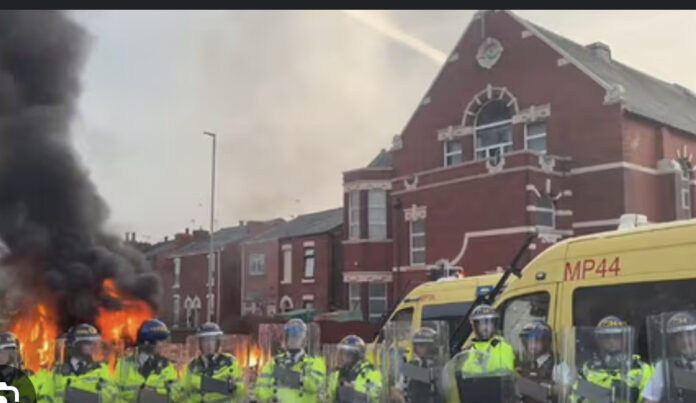Young people who took part in last summer’s riots were not primarily driven by social media misinformation or racism but by curiosity of the events, deep distrust of the police or the lack of opportunities in their community.
A report out today by the Children’s Commissioner Dame Rachel de Souza spoke to about 20 per cent of the children who were charged in the aftermath of the summer riots that broke out after the tragic murders of Bebe King, Elsie Dot Stancombe and Alice da Silva Aguiar in Southport in July
Hundreds of children – some as young as 11 – were caught up in the unrest in 26 areas across England following the lead of thousands of adults whose involvement was deemed to be racially motivated targeting locations known to house asylum seekers.
The findings of today’s report focus on children’s motivation for taking part, challenging the prevailing narrative that young people’s involvement was orchestrated by deliberate misinformation spread through social media linked to racist and right-wing influencers.
While these factors played a potential role, they did not appear to drive children’s actions.
Instead, many children’s involvement in the riots was spontaneous, not thought out and opportunistic. The report found that they were not primarily driven by far-right, anti-immigration or racist views. Children spoke about their curiosity of these events and their animosity towards the police.
Children’s Commissioner for England Dame Rachel de Souza said:
“Like everyone I was truly horrified and heartbroken by the deaths of those three little girls in Southport last July.
“The initial response from the community to their deaths brought out some of the best of humanity, as people shared their collective grief and shock. But within a day, violent unrest started to unfold across the country in an apparent response to claims made about the girls’ attacker.
“The involvement of children in those riots and the reasons they told me they got involved raise some really serious questions about childhood in England and why our children feel so disaffected and disempowered.”
The report also found the government’s response to the riots resulted in unusually severe charges and sentences, often overlooking children’s potential for rehabilitation.
Outcomes for children appeared to vary based on location, with inconsistent application of child-first principles and underutilised expertise of the Youth Justice Service (YJS).
Rachel de Souza added
“As Children’s Commissioner, it’s my duty to listen to children, regardless of their circumstances. This includes hearing the voices of young victims, and in exceptional circumstances like this, hearing directly from children accused of perpetrating violence against others. These conversations were striking, and often unsettling. Many described impulsive decisions, driven by disaffection or distrust of the police as factors for their involvement.
“This report does not excuse criminality. The harm caused by these children’s actions is undeniable. Many – but not all – of the children acknowledged the need for accountability and consequences for their actions. Today’s findings offer no simple solutions but paints a more complex picture than has been debated following the riots. However, it is one that we must grapple with in order to create a more positive experience of childhood than one this report sets out.”







